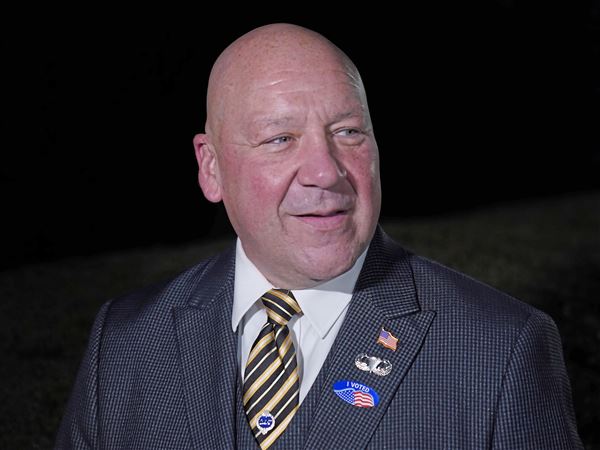Bethel Park School District Superintendent James Walsh is frustrated.
Each year he watches students sit for days at a time, scantron sheets and No. 2 pencils spread across their desks as they take Pennsylvania’s Keystone Exams and the Pennsylvania System of School Assessment, or PSSAs, as mandated by federal law.
Mr. Walsh also sees lost classroom time, tests that often don’t align with the curriculum and results that aren’t accurate depictions of his students’ abilities.
“It has an enormous impact on Bethel Park,” Mr. Walsh said of standardized tests. “These summative assessments really serve one big purpose and that’s for the label to categorize schools and students. It doesn’t serve the purpose, in my judgment, of improving outcomes for kids.”
Debates over standardized tests have roiled education discussions for years. But in that time little has been done to alter the system.
Now, however, COVID-19 might change that, as the pandemic has reignited nationwide calls for change.
In Pennsylvania lawmakers have proposed shifting the focus to benchmark testing as districts grapple with low standardized test scores, raising questions about the testing system and whether it’s giving baseline representations of where students stand in English language arts, math and science.
“It’s definitely been called into question more and more following the pandemic and some of the disruptive learning we’ve seen,” said Allie Pearce, a policy analyst at the Center for American Progress, an independent, nonpartisan policy institute. “I think it’s a really interesting conversation that’s happening nationally.”
In Pennsylvania, PSSA tests, which are given each April, began in 1992. They are taken by students in grades three through eight to assess English language arts and math. Keystone Exams started in 2012 as graduation requirements. The tests, focusing on Algebra I, literature and biology, replaced the 11th grade science PSSA.
The assessments are in response to the federal Every Student Succeeds Act, which requires every state to measure performance in reading, math and science. The 2015 bill replaced the 2001 No Child Left Behind Act, which coupled standardized test scores with high-stakes decisions such as funding.
But like states across the country — where math and reading performance of 13-year-olds hit the lowest level in decades, the National Assessment of Educational Progress said in June — Pennsylvania is struggling with standardized test scores following the pandemic.
Statewide, English scores increased from a 54.1% proficiency rate in 2021-22 to 54.5% in 2022-23. Math scores saw a 2.6% increase, rising from 35.7% in 2021-22 to 38.3% in 2022-23, state data show. Science, given to fourth and eighth graders, saw the biggest improvement, rising from 54.4% in 2021-22 to 58.9% in 2022-23. But those scores coupled with standardized tests being canceled in 2020 because of the pandemic has led to frustration among area superintendents and lawmakers.
“Each district has their own story and scores don’t really tell you the whole story, the story of that school or even each student, but yet we’ve got to spend weeks on end following mandates to get each test done and completed,” Cornell Superintendent Aaron Thomas said.
To help quell those frustrations, two Pennsylvania leaders — state Rep. Eric Nelson, R-Hempfield, and state Rep. Martina White, R-Philadelphia — have unveiled a plan that would replace PSSAs with benchmark tests. The tests would use competitive assessments to provide real-time student performance data to parents and teachers.
“It’s been talked about and complained about for years both from the administrators and from the teachers,” Mr. Nelson told the Post-Gazette. “I’m a believer that we have to assess ourselves in order to determine if we’re winning or losing in education. … We need to kind of upgrade how we’re assessing.”
Mr. Nelson said benchmark tests will save classroom time, provide real-time results that teachers can use to help students and save the state millions of dollars it spends on contracting with a Minnesota-based company for PSSA tests. He noted that several districts already use benchmark testing to get accurate representations of where their students stand.
A co-sponsor memo for the plan has been circulated but the bill has not yet been formally introduced.
But it mirrors steps being taken in other states. In New York, legislation was introduced this year to reduce the frequency of federally-mandated testing. The goal is to make classroom teaching time a priority over standardized test preparation. Florida in 2022 replaced its end-of-year assessments with a progress monitoring system, which assesses students three times a year. A similar model was implemented in Texas this year.
And U.S. Secretary of Education Miguel Cardona this year announced changes to the Innovative Assessment program, which was designed to encourage states to develop a new generation of state assessments. The goal is to improve current testing models, which are often multiple choice, and that, Mr. Cardona said at the time, have considerable limitations.
In Pennsylvania, Mr. Nelson’s plan is well-received by area superintendents. But it was met with hesitancy from statewide education organizations that said any changes to standardized tests would still have to align with federal standards laid out in ESSA.
And, Sherri Smith, executive director of the Pennsylvania Association of School Administrators said, the federal government is not likely looking to change the ESSA act.
“I love the discussion that it may be time for us to take a look at how we assess to meet those requirements in Pennsylvania but there’s a bigger conversation,” Ms. Smith said. “I think we first have to understand what those requirements are that we need to meet so that we don’t spend energy on something that can’t come to fruition.”
Local concerns
About five years ago, Franklin Regional School District officials made a decision: they would limit their focus on standardized test scores and instead use benchmark testing to help students navigate their 12 years of school.
That choice, Superintendent Gennaro Piraino said, has “freed” the Westmoreland County district of 3,372 students by allowing critical thinking and creativity in the classroom.
“The reality is the political game in Pennsylvania should be centered around measuring what our students really have to know, understand or be able to do to showcase the strength of the great things happening in Pennsylvania in our schools, as opposed to showing them as failures,” Mr. Piraino said.
Today, Franklin Regional’s benchmark tests follow district curriculum and align with national criteria. And on those tests, Mr. Piraino said, students are outperforming as compared to the standardized tests, which show that student scores in the district have not yet returned to pre-pandemic levels.
At Franklin Regional in 2023, almost 85% of fourth and eighth graders scored proficient on the science PSSAs. Of third through eighth graders, almost 63% were proficient in math and almost 78% in English language arts.
Mr. Piraino is now advocating for change to the state system he says is “terribly broken.”
“There’s a great opportunity for bipartisan efforts to work collaboratively to transform this assessment system to be one where it creates accountability so that we’re really looking at our schools providing students what they need for their future success,” Mr. Piraino said.
At South Allegheny, Superintendent David McDonald hopes to see an accountability system that also considers students going into trades or the military. The district currently teaches 1,393 students, almost 65% of whom are economically disadvantaged. And of graduating seniors, half go directly into the workforce, Mr. McDonald said.
“So 50% of our kids are thinking differently for their future and the workforce pathway and their career than they are thinking about how they score on a biology test or an algebra test or with PSSAs math and ELA and the science,” Mr. McDonald said. “There’s far more ways that we can hold schools accountable from a vision and a standpoint of how are we preparing kids for what’s next. Proficiency isn’t preparedness.”
In 2023 almost 61% of fourth and eighth graders in the district scored proficient on the science PSSAs. Of third through eighth graders, almost 27% were proficient in math and around 41% in English language arts.
Mr. McDonald noted that the state recently eliminated $800,000 from the district’s Level Up funding — or extra dollars that are allocated to the state’s 100 poorest districts — which was used to help kids on learning support.
“For districts like us, almost 70% of our kids are economically disadvantaged, 26% of our kids are learning support,” Mr. McDonald said. “That $800,000 was critical for us to help provide programs for kids that were trying to close the gap in those kinds of things yet it was eliminated from the budget yet they want us to be held accountable from a PSSA, Keystone standpoint and that’s how we get graded.”
Mr. Thomas of Cornell, a district of 526 students, added that frustrations around standardized tests stem from lost instructional time and the timeline for when test results are returned.
While he said conversations about altering the tests have taken place amongst superintendents and legislators for years he doesn’t “think they’re going to go anywhere anytime soon unfortunately.”
At Bethel Park — which teaches 3,939 students, 18% of whom are economically disadvantaged — Mr. Walsh said the tests are “flawed” as districts continue to struggle to return scores to what they were pre-pandemic. This year, almost 85% of fourth and eighth graders in the district scored proficient in science. Of third through eighth graders, almost 63% were proficient in math and almost 78% in English language arts.
But he cited a statistic from last year that found 26% of eighth graders in the U.S. were proficient in math, something he said people should be “screaming” about.
“It’s devastating on the teachers’ morale and their sense of efficacy and what programs we choose and how much time we spend on it and what our priorities are,” Mr. Walsh said of test scores. “We make all sorts of important decisions based on those results and if the results are skewed or if the results are inappropriate maybe the test is flawed. I don’t know what the story is but we’re probably making a lot of really important decisions on bad data.”
First Published: January 6, 2024, 10:30 a.m.
Updated: January 6, 2024, 7:03 p.m.






















